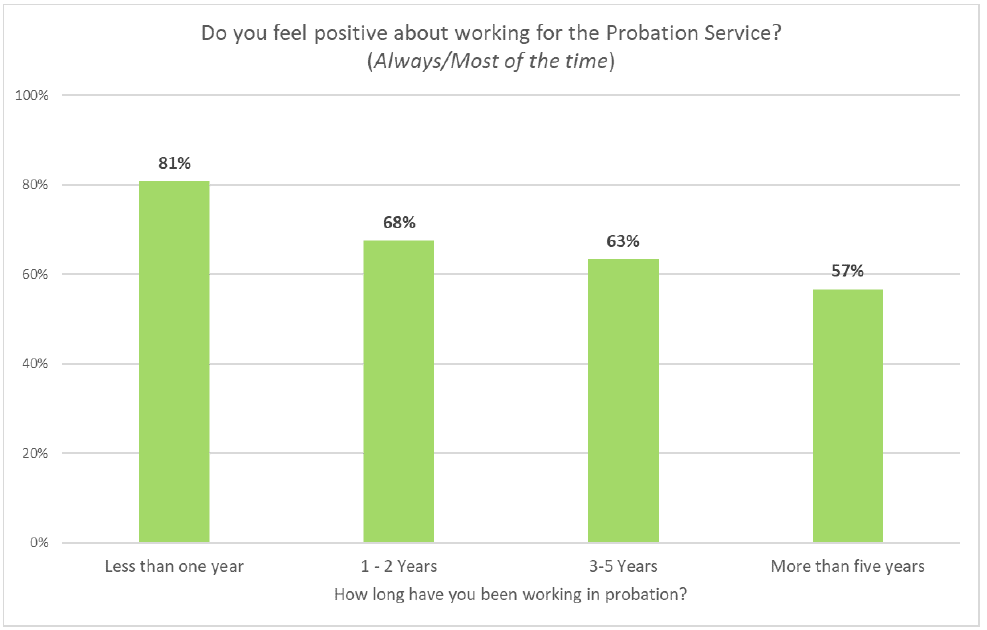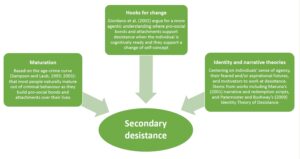Early views of new service
As regular readers will know, the probation inspectorate yesterday (2 March 2022) published its annual report, part of which was based on a survey of over 1,500 probation staff asking for their initial impressions of the new (re)unified service. The inspectorate published the survey findings in full and I thought readers might be interested in what frontline staff had to say.
1,534 people (just under 10 percent of the total probation workforce) responded to the survey; a slight majority (51 per cent) had worked previously in CRCs and just under half (47 per cent) in the NPS. Senior Probation Officers (SPO), Probation Officers (PO), Probation Service Officers (PSO), and Trainee Probation Officers (TPO) make up three quarters of the respondents, with the other quarter comprising residential workers, case admin staff, trainers, and programme delivery workers. The survey was conducted between 1 September and 5 October last year, so, needless to say, these are very preliminary impressions with unification only taking place 2-3 months earlier on 25 June 2021.
Key questions
Most staff (52%) had not formed a definitive view of unification at this early stage. The largest proportion stated they had seen no change (28%), an especially strong view among former NPS staff (34%). Only 12% of the probation frontline had formed the view that they believed unification had significantly (2%) or somewhat (10%) improved probation service delivery. Other key findings were:
- Less than two in three (61%) people thought that senior leaders had communicated their unification strategies sufficiently well. There was considerable regional variation, with the South West notably critical — only 40% of staff in that area were happy with the way changes had been communicated.
- Less than half (42%) responded that the unification changes had been implemented well. Significant regional variation was again seen; notably high satisfaction in Wales (74%) where unification had taken place at the end of 2019, and notably low in the South West (18%). Former CRC employees were significantly less satisfied with the implementation of the changes than former NPS employees; with positive response rates of 35% and 48% respectively.
- Over half (58%) of the survey respondents were satisfied that they were receiving case-focused supervision. (For a third this question was not applicable.) Again, region was a key driver, with Wales recording the highest satisfaction level (71%), and notably low satisfaction levels for this question within the South West (42%) and West Midlands (35%). There was interesting additional breakdown of information on this really important issue. Ethnic minority staff were less likely to respond that they were receiving sufficient case-focused supervision (49% Always/Mostly) than their white peers (61%). Part-time employees were less likely (51%) to respond positively than their full-time colleagues (59%), and there were further differences by grade; majorities of PSOs (64%) and TPOs (75%) responded that they were receiving sufficient supervision, compared to around half of SPOs and POs.
Pride in probation?
Perhaps the most interesting responses were to the question: “Do you feel positive about working for probation?”. 13% always did, and 47% did most of the time. The key driver of positive orientation to working for the new service was length of service, with those who have worked for more than five years being less likely (57%) to be positive about working in probation. Details in the graphic reproduced below:
Main themes
In their analysis, the inspectorate identify a number of key themes which are summarised briefly below. Interested readers can access the survey report directly from this link.
Divisions between from CRC & NPS staff
The new service faces the challenge of helping to foster a new identity for all staff, and leave behind the divisions of Transforming Rehabilitation. Many former CRC staff said they felt disrespected during unification, that their skills and knowledge have been minimised, and they have been condescended to and treated as inferior. The report includes comments from ex-CRC staff summing up their frustration:
“There is a clear sense that some staff and managers within what was NPS NW believe that anyone from the CRC is not competent.” (Greater Manchester, CRC)
“CRC staff were treated like new employees with no acknowledgment of existing skills.” (West Midlands, CRC)
“CRC staff have been treated like second class citizens…..awful!” (London, CRC)
“Not enough has been done to address the culture of us and them. As a member of CRC staff I am made to feel second rate to NPS staff.” (East Midlands, CRC)
Induction training was too fast
Many ex-CRC staff comments concerned information overload and the demanding pace of training immediately after unification:
“My experience of the changes has been that high-minded missives are sent out from senior managers saying how wonderful it’s all going to be but this aspirational vision then gets totally lost and bears no resemblance at all to the implementation. It has been chaotic and stressful, with no sign of any positives in the near future.” (Kent, Surrey and Sussex, CRC)
“Legacy CRC staff have received a significant influx of new information, guidance and training, which has been wholly overwhelming.” (South West, CRC)
“Too much information sent out in email. It was information overload. Changes should have been sequenced over a longer period.” (East of England, NPS)
High workloads
Unification came at a difficult point, in the middle of a pandemic, just as lockdowns were starting to be relaxed. Unification made existing pressures of workload and caseload more acute, and staff felt this was not appreciated by senior leaders.
“Unification needed to happen. We shouldn’t have split in the first place, however, the workload has increased at a very quick pace which has been overwhelming and unmanageable, particularly at a time when there are lots of system changes.” (East Midlands, NPS)
“Senior Leaders had an unrealistic idea that once caseloads merged, workload would become more manageable, without recognising that unless staff are retained or replaced or indeed recruited, the issue of significantly high caseloads will remain. The staff training programme, particularly the timescales in which this needs to be completed, is unrealistic, given that staff don’t have the time to complete their daily tasks, let alone required training.” (East Midlands, NPS)
“I went from feeling confident and at the top of my game to feeling isolated, stupid, scared and now lacking in confidence. Caseloads are dangerously high, staff going off sick, important work being missed.” (West Midlands, CRC)
ICT problems
And of course, probation wouldn’t be probation without technology problems. Quite a number of staff were concerned that their new laptops and ICT systems were not functioning well, and there was a lack of training and documentation available to staff. Many were again frustrated that there was not enough time allowed to get to grips with the new systems.
Hopes for the future
Nevertheless, inspectors noted that some staff expressed a more positive orientation to unification.
“So much information, opportunities and training, really looking forward to my new career.” (Greater Manchester, Other)
“Overall, it has been a very smooth transition. So nice to have a decent IT service. NPS people have been very welcoming and I think we’ve all adapted really well to the changes considering the pandemic in the mix as well.” (East Midlands, CRC)
“Prior to unification there was a “them” and “us” divide between NPS and CRC staff with NPS staff appearing to occupy the moral high ground. This changed completely after unification and I was pleased with the warm welcome we received in our shared building where former NPS staff went out of their way to implement re-integration of the former CRC staff.” (London, CRC)
“I think it has gone smoothly for me personally – no issues.” (East of England, CRC)
“I’m happy about the recent changes. I’ve been in the service for over 20 years and witnessed what feels like continual change, some of which for no good reason, and sometimes only to revert back to the way it was before! Maybe let the model settle down and just tweak to improve delivery as required, please.” (Wales, NPS)
Conclusion
It is worth re-stating that this was a very early survey which provides a snapshot of a new service with huge administrative and organisational challenges again. It will be interesting to see how long it takes for all staff to feel part of the new service and whether most are able to feel proud to be a probation officer in the near future.










One Response